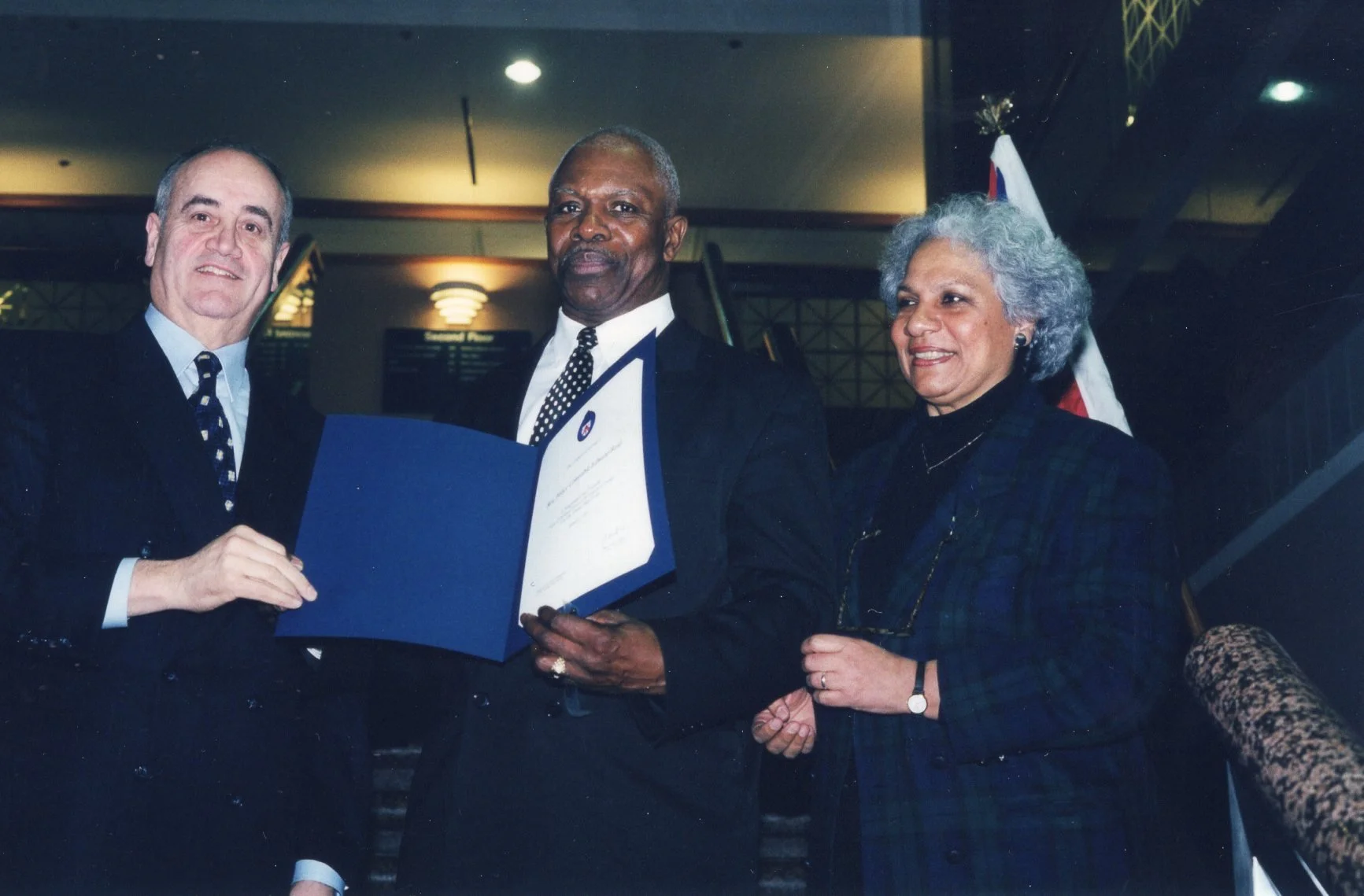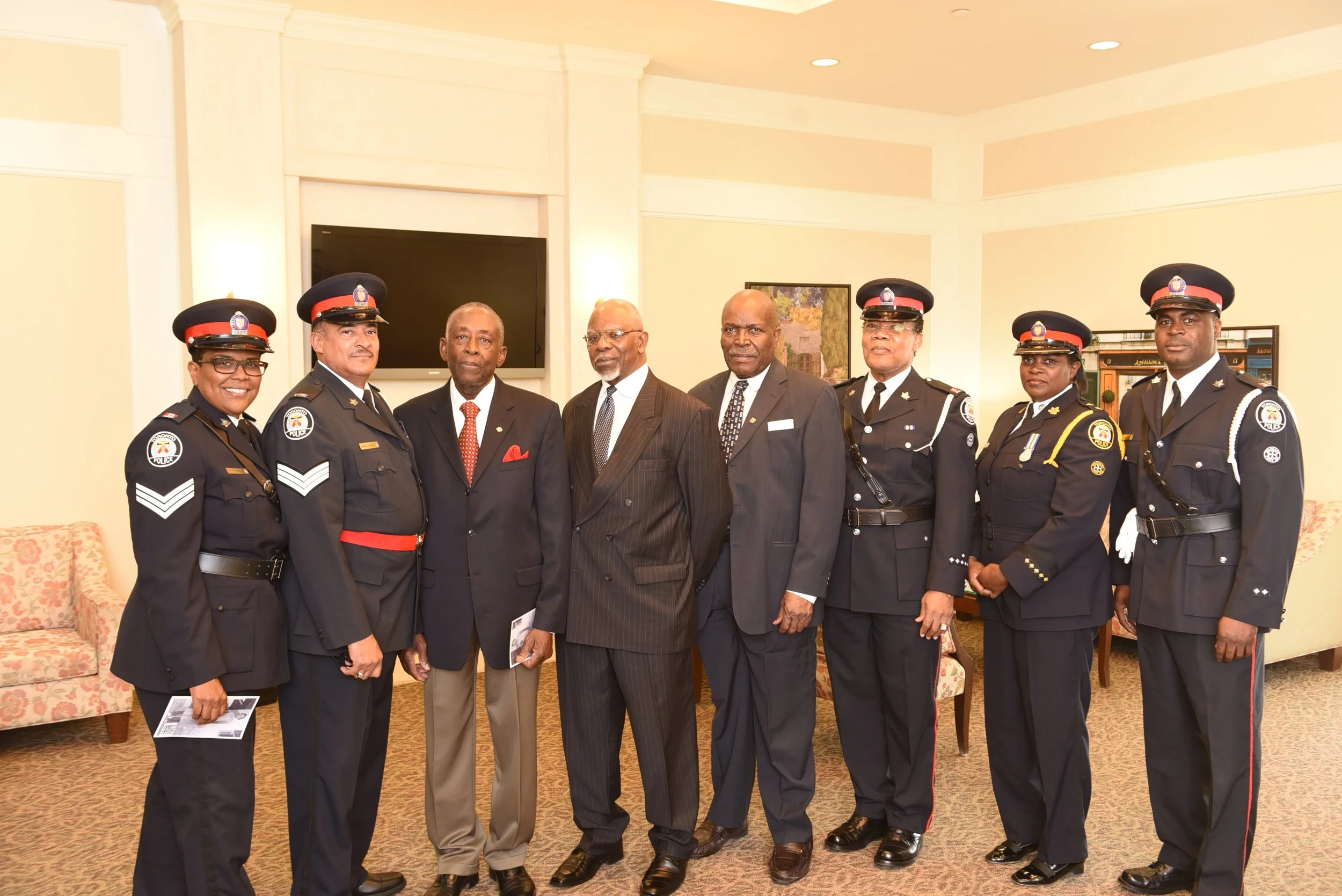Toronto's second Black male cop Ed Reid blazed a trail
February 17, 2022
Sir Isaac Newton, considered one of the most influential scientists in history, once said, ‘By standing on the shoulders of those who came before us, we can see further and achieve more’.
When Ed Reid left Jamaica in April 1963, he had no idea he would be blazing a trail for Black police officers in the city, some of whom rose to Command positions.
Two days after arriving in Toronto, his sister took him to Toronto Police headquarters, then located at 92 King St. E., to apply to be a uniformed officer.
“I was given some math and general knowledge questions and the next morning they got back to me, saying I had passed the test and I should come back and fill up an application form,” he recalled. “That is how it was done back then.”
While waiting for the background check to be completed, Reid worked in construction through a staffing agency, earning $1.25 hourly while temporarily residing at 42 Boswell Ave. with Benny and Geraldine Walker who was a distant cousin.
She was the sister of hockey pioneer Herb Carnegie.
Once cleared to work with Canada’s largest municipal police service, Reid joined on June 25, 1963, making him the second Black male officer after fellow Jamaican Larry McLarty who made history three years earlier. He died in December 2016.
After three months training at Toronto Police College at 311 Greenfield Ave. in North York, he was assigned to work undercover in 14 Division where he spent almost half of his policing career.
With off-track betting illegal then, the rookie cop posed as a bookie and helped make several arrests before his cover was blown.
“While on the job in the Jarvis & Front Sts. area, a guy approached me asking if I was a police officer,” Reid recounted. “I said ‘no’ and his response was,’ yes, I believe you are’. When I told my Inspector what happened, he said it seemed they know who you are and it doesn’t make sense for you to continue in that role.”
Then Chief Julian Fantino (l) & Canada’s first Black Senator Anne Cools present a certificate to Reid at Toronto Police Service's ninth annual Black History Month celebration in February 2002 (Photo by Ron Fanfair)
Switching to uniform after four months, he began walking the beat in the same division.
“Those days, police officers were told they had to do that for at least two years before seeing the inside of a squad car,” said Reid who returned to plainclothes and did drug buys later on in his career. “Now, you graduate and you are in a police vehicle the next day.”
Traversing on foot during the harsh winter months was challenging.
“At one point while with 52 Division, we had a post called ‘Three Extra’ and sometimes on my way to work for the night shift, I would pray to God that I am not sent there,” he pointed out. “A squad car would take you to the Birks jewelry store on Yonge St. just south of Queen St. From the time you are dropped off around midnight to the end of your shift, you just stood in front of that store. The only relief was a one-hour lunch break. Up to now, I don’t know the reason for officers being sent to that location. All I know is that that there was no need for an officer to stand there for an entire shift, because I could see a security guard on duty walking back and forth inside the store.”
Tough shift assignments weren’t all that Reid had to contend with.
“I was often called derogatory names by other Constables and when I told my Sergeant, he would say, “Ah, come on Ed, the guys don’t mean anything and they are only fooling around,” he said. “I was accused of having a chip on my shoulder. On another occasion at 14 Division, myself along with Karl Oliver, Neville Watson and about two other Black officers were at the early morning parade when we saw racial messages written on the chalkboard in the guardroom. It was claimed that there was an investigation to determine the author, but nothing happened.”
Reid retired in September 1993 at age 55 after 30 years on the job.
His only regret was not being promoted.
“The first time I wrote my promotional exam in 1968, I passed,” said Reid who also served with the Traffic and Ethnic Units. “I was told it was just a matter of time, but it never happened even though I went so far as to submit a resume as requested by an Inspector which was something that was never done before to get a promotion. That didn’t work. It was really heart rendering. My pension would have been substantially better if I had made it to Sergeant. However, I had a good run and helped a lot of people.”
The significant increase in the number of Black officers receiving promotions pleases him.
“That’s one of the areas that there has really being a big improvement in,” said Reid. “During my time, just a few got promotions. It wasn’t until some influential people in the city’s Black community started asking serious questions that we began to see some change. Most of the officers in my time were policemen in the Caribbean. We were bright, knowledgeable, and well trained, yet that really didn’t seem to mean anything. I am happy with what I am seeing now as we have had a Black Chief and Deputy Chiefs. That gives me a lot of pride.”
For young people considering a career in policing, he has some sound advice.
“You shouldn’t look at it as a job where you can make some good money or exert authority,” Reid said. “I remember making a presentation at the college about cross-cultural communication and how officers should treat people with respect and there was this recruit that piped up and said ‘I can’t wait to get out on the street and kick assess. In order to get respect, you have to give it. Be always courteous and act professionally. Policing is a career where you can help people and make significant changes in the community.”
After retirement, he spent just over a year at the Jamaican Consulate in Toronto chauffeuring late Consul General Margarietta St. Juste and helping out in the office, and a few months with Big Brothers Big Sisters of Toronto assisting with the recruitment of Black mentors before joining the defunct Timothy Eaton Secondary School in Scarborough as a hall monitor, a position he held for 18 years.
Ed Reid (fourth from left with glasses) joined former and current officers Bonnie Estwick (l), Winston Laroche, Stan Pinnock, George White, Tony Pinnock, Sonia Thomas and Brian Sutherland at the funeral of the Service’s first Black female officer Gloria Bartley in May 2018 (Photo by Ron Fanfair)
Policing was on Reid’s radar since his brother’s death six decades ago.
He believes it was a murder even though the investigators’ ruling was ‘accidental drowning’.
On Christmas Day 1959, Reid – who with his three younger siblings were raised by their mom in Bombay, Manchester after their father died when he was three years old -- joined the Jamaica Constabulary Force.
Starting at Cross Roads Police Station in Kingston, he was transferred to Traffic headquarters on Elletson Rd.
Reid’s sister, Joyce Smith, sponsored him. The Florida resident came to Canada in 1960 after training as a nurse in England.
“I asked her to inquire from the police department in Toronto if I would be able to join when I came,” he said. “She had a female friend who attended church with her and was a Sergeant with the Service. The lady assured her I would once I fulfill the requirements.”
Married for 57 years, Reid and his wife have three children.








